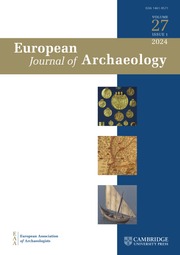Article contents
Phenomenology in practice: towards a methodology for a ‘subjective’ approach
Published online by Cambridge University Press: 25 January 2017
Abstract
The article deals with the practice of phenomenological archaeological fieldwork, which is concerned with sensory experience of landscapes and locales. Phenomenological approaches in archaeology have cast light on aspects of past human experience not addressed by traditional archaeological methods. So far, however, they have neither developed explicit methodologies nor a discussion of methodological practice and have laid themselves open to accusations of being ‘subjective’ and ‘unscientific’. This article describes and explores three experiments in phenomenological archaeology developed in the context of the Tavoliere–Gargano Prehistory Project and carried out on Neolithic settlement sites of the type known as villaggi trincerati. Our aims are both to develop explicit methods for this type of fieldwork and to combine phenomenology with other more traditional approaches, such as those concerned with technological, economic and environmental aspects of landscapes and sites. Our work also differs from other phenomenological archaeology in its concern with familiar, everyday experience and domestic contexts, rather than exceptional, special experience in ritual contexts. We consider how our particular approach might be used to further understandings of past lives.
Cet article étudie la pratique des recherches archéologiques phénoménologiques, qui se rapportent à l'expérience sensorielle des paysages et lieux. Les approches phénoménologiques en archéologie nous ont successivement permis de mieux connaître certains aspects des expériences humaines du passé, aspects non abordés par les méthodes archéologiques traditionnelles. Jusqu'à présent, néanmoins, n'ont été développé ni des méthodologies explicites ni une discussion des pratiques méthodologiques, lesquelles par conséquent se voient qualifiées de ‘subjectives’ et ‘non scientifiques’. Nous allons décrire et étudier ici trois expériences en archéologie phénoménologique développées dans le contexte du projet préhistorique de Tavoliere-Gargano et réalisées dans des habitats néolithiques du type nommé villaggi trincerati. Nos buts sont d'une part de développer des méthodes explicites pour ce type de recherche sur le terrain, et d'autre part de combiner la phénoménologie à d'autres approches plus traditionnelles, comme celles étudiant les aspects technologiques, économiques et environnementaux des paysages et des sites. Notre travail se consacre, contrairement à d'autres études phénoménologiques, également aux expériences familières de tous les jours et aux contextes domestiques plutôt qu'aux expériences exceptionnelles et particulières rencontrées dans les contextes rituels. Nous analysons comment notre approche particulière pourra servir à mieux comprendre les vies des temps révolus.
Zusammenfassung
Dieser Aufsatz beschäftigt sich mit der Praxis der Phänomenologie in der archäologischen Feldforschung, die in der sensorischen Erfahrung von Landschaften und Plätzen ihre Anwendung findet. Phänomenologische Ansätze in der Archäologie haben schrittweise Aspekte vergangener menschlicher Erfahrungen beleuchtet, die sich mittels traditioneller archäologischer Methoden nicht ermitteln lassen. Allerdings wurde bislang weder eine verbindliche Methodik entwickelt, noch eine Diskussion methodischer Praxis geführt – was diese Ansätze für Anschuldigungen angreifbar machte, sie seien „subjektiv” und „unwissenschaftlich”. Dieser Artikel beschreibt und untersucht drei Experimente phänomenologischer Archäologie, die im Rahmen des Tavoliere-Gargano-Prehistory-Project entwickelt und an neolithischen Siedlungen durchgeführt wurden, die als villaggi trincerati bekannt sind. Unsere Ziele bestehen darin, konkrete Methoden für diesen Typ von Feldforschung zu entwickeln wie auch Phänomenologie mit anderen – traditionelleren – Forschungsansätzen zu verknüpfen, die sich z. B. mit Aspekten von Technik, Ökonomie und Umweltfaktoren von Landschaften und Fundplätzen beschäftigen. Unsere Studie unterscheidet sich auch darin von anderen Untersuchungen zu phänomenologischer Archäologie, dass sie sich mit den „gewöhnlichen”, alltäglichen Erfahrungen und häuslichen Kontexten auseinandersetzt, anstatt auf exzeptionelle, spezielle Erfahrungen in rituellen Kontexten zu fokussieren. Wir stellen Überlegungen an, wie unser Forschungsansatz für ein vertieftes Verständnis vergangener Leben genutzt werden kann.
Keywords
Information
- Type
- Articles
- Information
- Copyright
- Copyright © 2006 Sage Publications
References
- 72
- Cited by

